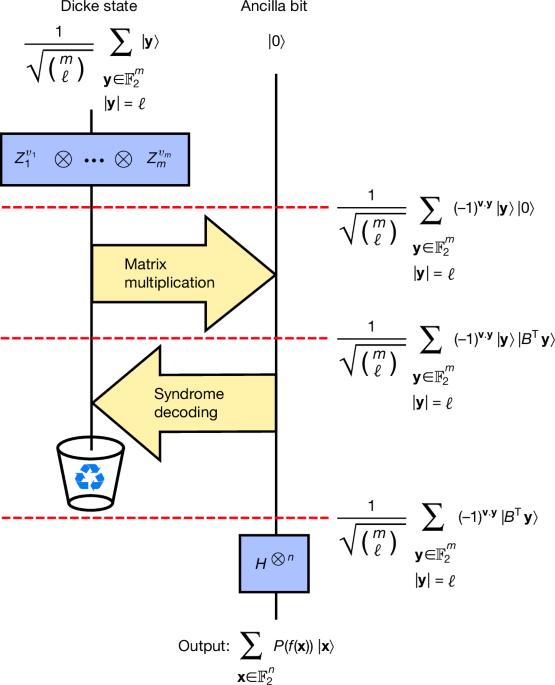Optimization by decoded quantum interferometry
IF 48.5
1区 综合性期刊
Q1 MULTIDISCIPLINARY SCIENCES
引用次数: 0
Abstract
Achieving superpolynomial speed-ups for optimization has long been a central goal for quantum algorithms1. Here we introduce decoded quantum interferometry (DQI), a quantum algorithm that uses the quantum Fourier transform to reduce optimization problems to decoding problems. When approximating optimal polynomial fits over finite fields, DQI achieves a superpolynomial speed-up over known classical algorithms. The speed-up arises because the algebraic structure of the problem is reflected in the decoding problem, which can be solved efficiently. We then investigate whether this approach can achieve a speed-up for optimization problems that lack an algebraic structure but have sparse clauses. These problems reduce to decoding low-density parity-check codes, for which powerful decoders are known2,3. To test this, we construct a max-XORSAT instance for which DQI finds an approximate optimum substantially faster than general-purpose classical heuristics, such as simulated annealing. Although a tailored classical solver can outperform DQI on this instance, our results establish that combining quantum Fourier transforms with powerful decoding primitives provides a promising new path towards quantum speed-ups for hard optimization problems. Decoded quantum interferometry is a quantum algorithm that uses the quantum Fourier transform to reduce optimization problems to decoding problems.

解码量子干涉法优化
实现超多项式的优化加速一直是量子算法的中心目标。本文介绍了译码量子干涉法(DQI),这是一种利用量子傅立叶变换将优化问题简化为译码问题的量子算法。当在有限域上逼近最优多项式拟合时,DQI比已知的经典算法实现了超多项式的加速。由于问题的代数结构反映在解码问题中,可以有效地求解,从而产生了加速。然后,我们研究了这种方法是否可以实现缺乏代数结构但具有稀疏子句的优化问题的加速。这些问题被简化为解码低密度奇偶校验码,对于这种码,我们已经有了强大的解码器n2,3。为了测试这一点,我们构建了一个max-XORSAT实例,DQI找到近似最优的速度比通用的经典启发式方法(如模拟退火)快得多。尽管定制的经典求解器在这种情况下可以优于DQI,但我们的研究结果表明,将量子傅立叶变换与强大的解码原语相结合,为解决困难优化问题的量子加速提供了一条有希望的新途径。解码量子干涉测量是一种利用量子傅立叶变换将优化问题简化为解码问题的量子算法。
本文章由计算机程序翻译,如有差异,请以英文原文为准。
求助全文
约1分钟内获得全文
求助全文
来源期刊

Nature
综合性期刊-综合性期刊
CiteScore
90.00
自引率
1.20%
发文量
3652
审稿时长
3 months
期刊介绍:
Nature is a prestigious international journal that publishes peer-reviewed research in various scientific and technological fields. The selection of articles is based on criteria such as originality, importance, interdisciplinary relevance, timeliness, accessibility, elegance, and surprising conclusions. In addition to showcasing significant scientific advances, Nature delivers rapid, authoritative, insightful news, and interpretation of current and upcoming trends impacting science, scientists, and the broader public. The journal serves a dual purpose: firstly, to promptly share noteworthy scientific advances and foster discussions among scientists, and secondly, to ensure the swift dissemination of scientific results globally, emphasizing their significance for knowledge, culture, and daily life.
 求助内容:
求助内容: 应助结果提醒方式:
应助结果提醒方式:


